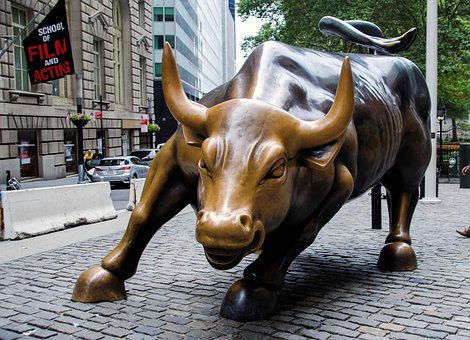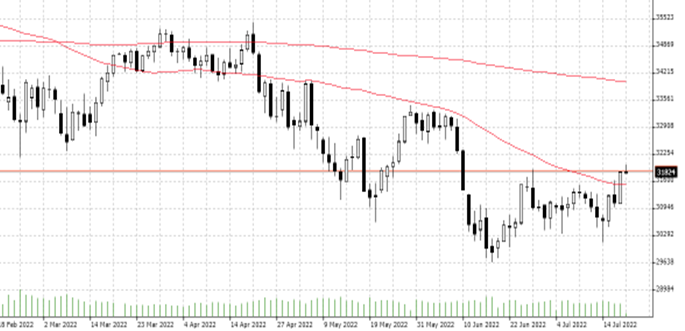

20.07.2022 – It’s over – an end to the stock market slump: if Wall Street’s biggest bear so far has his way, we’re in for a bull market. According to Bank of America, pessimism among fund managers has rarely been greater. Yesterday’s price jump in the stock indices supports this thesis.
Finally, another day of joy for the bulls – Wall Street set the pace yesterday, the DAX followed. Particularly impressive was the jump in the Dow Jones, which you can see in the daily chart. The US leading index has broken through the 50-day line, the next stop could be the 200-day line.

Source: Bernstein Bank GmbH
So are we witnessing a reversal right now? Who knows. Already last Thursday, Bloomberg commented that speculators in the futures market are extremely short positioned. For the financial blog ZeroHedge a clear contra-indicator; the blog further judged that both retail investors and institutional investors would soon throw in the towel because they were frustrated by the constant “buy the dip”. And then yesterday was the big day on Wall Street.
Complete capitulation
Yesterday, Bank of America Chief Investment Strategist Michael Hartnett also released his latest survey of fund managers for the month of July. The startling result: “full capitulation” and a “dire level of investor pessimism.” Although Hartnett sees poor fundamentals for the second half of 2022, he judged “sentiment says stocks/credit rally in coming weeks.” And here’s some more investment-speak so you can see for yourself: “H2’22 fundamentals poor but sentiment says stocks/credit rally in coming weeks.” And further: “contrarian Q3 trade is risk-on if no Lehman, CPI down, Fed pause by Xmas…short cash-long stocks, short US$-long Eurozone, short defensives-long stocks banks & consumer.”
Fund managers extremely pessimistic
Here are some details from the Fund Manager Survey (FMS). The survey ran between July 08 and July 15, surveying 293 professionals with $800 billion in assets under management. According to the survey, fund managers have reached an all-time low in expectations for global growth: according to the survey, global growth expectations have fallen to minus 79 percent; expectations of a new recession are at their highest level since May 2020. Earnings expectations have also reached a new all-time low. At the same time, cash levels compared to assets under management would be at 6.1 percent, the highest level since September 11, 2001, and equity allocation at the lowest level since the Lehman crash.
Dollar and commodities in focus
The BofA Bull & Bear Indicator is at its lowest all-time low of 0.0, and 76 percent of respondents see inflation collapsing in the coming year. The expectation now, they say, is for stagflation – the Federal Reserve will still have to raise interest rates by 150 basis points and change policy when the core inflation rate is below 4 percent. The most crowded trade currently is long dollar – so the greenback should dip soon; the most crowded trade after that is long commodities/energy.
The Bottom Line: The biggest bear on Wall Street so far has turned into a bull. We are curious to see if the excessive pessimism observed by Bank of America is now actually turning into a bull market. And whether yesterday was the starting signal for it. Bernstein Bank wishes successful trades and investments!
Important Notes on This Publication:
The content of this publication is for general information purposes only. In this context, it is neither an individual investment recommendation or advice nor an offer to purchase or sell securities or other financial products. The content in question and all the information contained therein do not in any way replace individual investor- or investment-oriented advice. No reliable forecast or indication for the future is possible with respect to any presentation or information on the present or past performance of the relevant underlying assets. All information and data presented in this publication are based on reliable sources. However, Bernstein Bank does not guarantee that the information and data contained in this publication is up-to-date, correct and complete. Securities traded on the financial markets are subject to price fluctuations. A contract for difference (CFD) is also a financial instrument with leverage effect. Against this backdrop, CFD trading involves a high risk up to the point of total loss and may not be suitable for all investors. Therefore, make sure that you have fully understood all the correlating risks. If necessary, ask for independent advice. CFDs are complex instruments and are associated with the high risk of losing money quickly because of the leverage effect. 68% of retail investor accounts lose money trading CFD with this provider. You should consider whether you understand how CFD work and whether you can afford to take the high risk of losing your money.7
